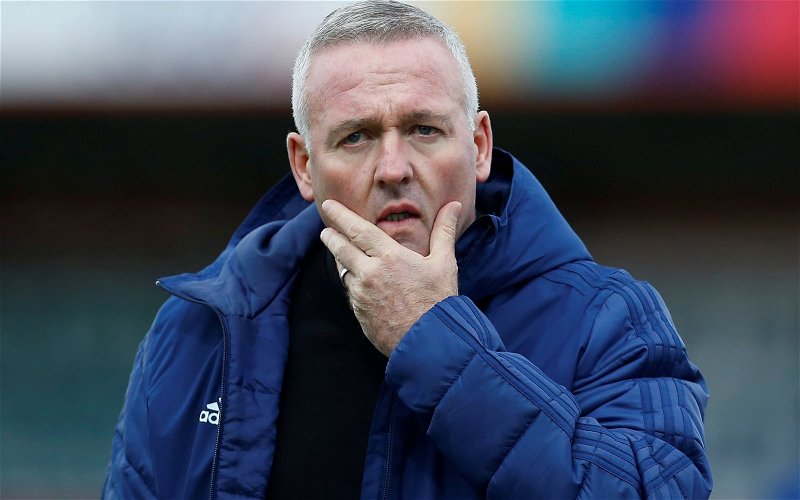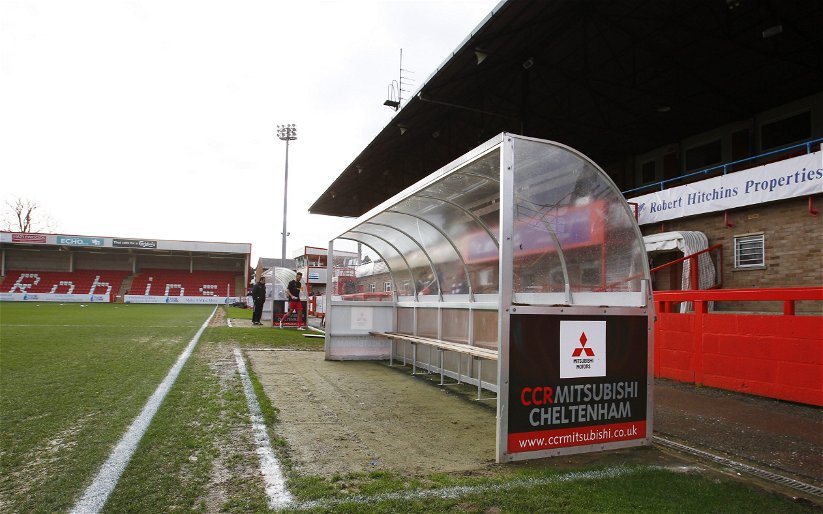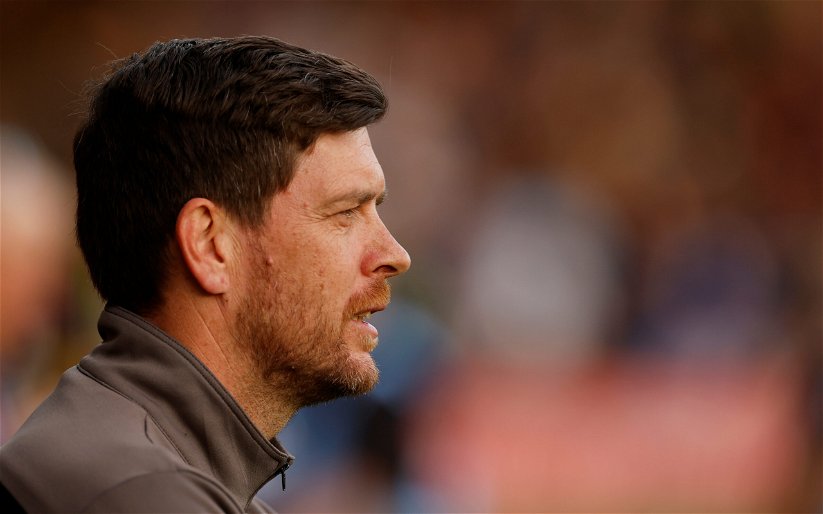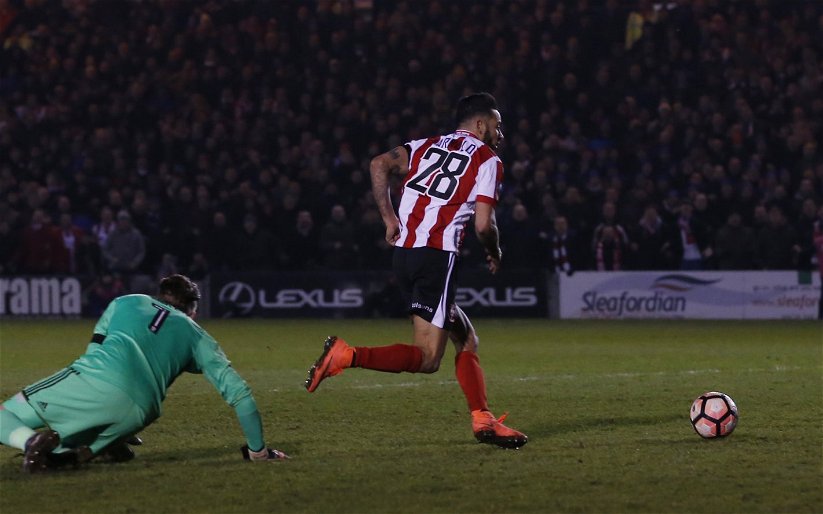With well over 700 appearances, forty full international caps, four SPL titles, four Scottish FA Cups, two Scottish League Cups, a Scottish Footballer of the Year award, the 1998 World Cup finals, a Champions League win, a UEFA Cup runners-up medal and being captain of his country on fifteen occasions, Paul Lambert is, without doubt, the most illustrious former player in League One. Although the vast majority of his career as a manager has been spent in England, it is somewhat surprising to learn that a player with his obvious ability never kicked a ball here.
Starting his youth career with Linwood Rangers in 1980, central midfielder Lambert was picked up by local club St Mirren in August 1985 when he turned sixteen. Having made one brief appearance during 1985-86, Lambert won a permanent place in the St Mirren side at the start of the 1986-87 season and had a year to remember. In his first full season as a footballer, he won a Scottish Cup winners medal as his side beat favourites Dundee United 1-0 with an extra-time winner from Ian Ferguson. Despite being a dreadful match, the final was notable for two other reasons: it was the last time the Scottish Cup was won by a team comprised entirely of Scottish players, and also the last final where both teams and both managers were Scottish.
It was inevitable that the 1987-88 season would not be as successful, and only two wins from their final two games prevented relegation from the SPL. Lambert made his European debut in the 1-0 Cup Winners’ Cup first-round win over Tromso on 16 September 1987 before they were beaten 2-0 on aggregate by eventual winners Mechelen. Lambert missed much of the 1988-89 season as St Mirren finished seventh, and the following season was part of the side that set a new club record of seven successive league games without scoring. Having scored just twenty-eight league goals in total, it was a wonder they were not relegated.
St Mirren finished bottom of the SPL in 1990-91 with only five wins to their name, but avoided relegation due to the expansion of the division from ten to twelve clubs. On a personal level, Lambert made his Scotland U21 debut on 11 September 1990 against Romania, the first of 12 caps at that level. The two goals he scored is a record for a St Mirren player at U21 level. It proved a short stay of execution as they were relegated the following season after finishing second from bottom. An immediate return to the SPL was expected in 1992-93, but the side got off to a terrible start with a 7-0 defeat at Raith on the opening day. Bizarrely, they then went six games without conceding a goal and did not lose again until the end of October. That poor start came back to bite them, missing promotion by three points. With the failure to return to the SPL at the first attempt, it became increasingly likely that Lambert would be sold, and he signed for SPL side Motherwell for £250,000 on 7 September 1993. In total, he made 261 appearances for St Mirren, scoring 15 goals.
It was the start of a mini-golden age at Fir Park as Motherwell finished third in Lambert’s first season, thereby qualifying for the UEFA Cup ahead of Celtic. They went one better in 1994-95, finishing runners-up behind champions Rangers to give them their highest league finish since 1934. But it was the European campaign that season that changed the direction of Lambert’s career. Having disposed of Havnar from the Faroe Islands to the tune of 7-1, Motherwell were drawn against German giants Borussia Dortmund. Despite losing the tie 3-0 on aggregate, Lambert’s performances struck a chord with manager Ottmar Hitzfeld, of whom more shortly. He also made his full debut for Scotland on 21 May 1995 in a 0-0 draw against Japan in Hiroshima. Motherwell had a poor season in 1995-96, slipping to eighth in the league and surprisingly losing to Finnish minnows MyPa in the preliminary round of the UEFA Cup.
Lambert picked up Motherwell’s Player of the Season award in May 1996 but at almost 27 he knew it was his last chance to make the real big time. Without telling Motherwell manager Alex McLeish, he was offered trials with PSV Eindhoven, and UEFA Cup conquerors and current Bundesliga champions Borussia Dortmund. The trial under Dick Advocaat at Eindhoven went quite well but he was uncertain after being played out of position. He headed off to appear for Dortmund in a couple of pre-season tournaments, but conversely felt he had not played well enough. There were five of Germany’s 1996 World Cup-winning side at Dortmund and he was not optimistic, but Hitzfeld was impressed and offered Lambert a deal.
Hitzfeld made it clear that he would be second choice behind new signing Paolo Sousa, but Sousa injured a knee soon afterwards and Lambert took his chance. He made his debut in a 4-2 defeat to Bayer Leverkusen on 17 August 1996, but scored and kept his place for the remainder of the season. Hitzfeld played him more as a defensive midfielder, although he had never really been a goalscorer. He made 44 appearances as Dortmund finished third in the league, thereby losing the title they had won the previous two seasons. But 1996-97 will be remembered for the Champions League win. Having beaten Manchester United 1-0 in both legs of the semi-final, Lambert starred as his side beat Juventus 3-1 to lift the trophy for the first and so far the only time in the club’s history. In so doing, Lambert became the first British player to win the European Cup with a club outside of the UK.
Curiously, despite the success the club enjoyed and his popularity with the fans, his stay in Germany was destined to last only that one full season. He kept his place in 1997-98, and had made a further thirteen appearances when he was unexpectedly sold to Celtic on 7 November 1997 for £2 million.
His time at Celtic was to bring great success, with four SPL titles, three Scottish FA Cups, two Scottish League Cups and the domestic treble in 2001. Indeed, one of Lambert’s first games for Celtic was to help them win the League Cup with a 3-0 win over Dundee United on 30 November 1997. As far as the league was concerned, Celtic were under the thumb of their Glasgow neighbours. Rangers had won the last nine SPL titles, equalling the record held by Celtic themselves. A 2-0 win over St Johnstone on the final day gave Celtic the title, thereby preventing Rangers from breaking the record.
During the summer of 1998, Lambert appeared in the World Cup Finals, held in Brazil. Scotland had the unenviable task of facing the hosts in the opening game of the tournament but achieved a creditable 2-1 defeat. However, a draw with Norway and a defeat to Morocco ended Scotland’s World Cup campaign, and they have not been back since.
In 1998-99 there was a new man in charge. Despite winning the title, Wim Jansen had resigned and been replaced by the somewhat anonymous Josef Venglos. Celtic’s defence of the title got off to a poor start, with a run of five games without a win causing serious damage to their hopes. A defeat in the League Cup at the hands of Airdrieonians did not help matters, neither did the club imposing a ban on management and players speaking to the media. Celtic also exited the Champions League in the second qualifying round, and despite form picking up in the second half of the season, they lost the title race to Rangers by six points. To compound matters, they also lost the cup final to Rangers to end a poor season.
The 1999-2000 season saw Celtic under the curious management team of John Barnes and Kenny Dalglish, and things did not go well. Lambert was badly injured in a collision with Rangers midfielder Jörg Albertz in an unpleasant Old Firm derby in November, losing several teeth and breaking his jaw. Lambert missed the League Cup Final win over Aberdeen through injury, and also had the good fortune to miss Celtic’s humiliating 3-1 home defeat to Inverness in the SFA Cup, a giant-killing that inspired the memorable ‘Super Caley Go Ballistic Celtic Are Atrocious’ headline. Celtic finished a huge 21 points behind Rangers, and Barnes and Dalglish departed.
And so Celtic started their third season in a row under new management. This time it was the turn of Martin O’Neill to have a go, and 2000-01 proved to be a magical season as they won the treble. Celtic won their first eight league games including a 6-2 thumping of Rangers, and took the title by fifteen points despite losing the final two games. Kilmarnock were beaten in the final of the League Cup and Hibernian in the SFA Cup, both by 3-0 score lines. Celtic were even more dominant in the league in 2001-02, losing just one game as they amassed a massive 103 points. They lost the SFA Cup to Rangers, beaten 3-2 in the final, and were also knocked out of the League Cup by them in the semi-finals. Lambert capped a great season by being named Scottish Footballer of the Year.
Celtic lost the league title again in 2002-03 to Rangers, although it could not have been closer: finishing level on points, Rangers’ goal difference of +73 was just one better than Celtic’s. Not even a 4-0 win on the final day proved enough, as Rangers beat Dunfermline 6-1 to snatch the title away. Striker Chris Sutton accused Dunfermline of ‘lying down’ and was forced to apologise. However, the season will be largely remembered for a breathtaking run to the UEFA Cup Final under captain Lambert. A disappointing Champions League qualifying round exit to Basel was forgotten as Celtic disposed of FK Südova, Blackburn Rovers, Celta Vigo, Stuttgart, Liverpool and Boavista to reach the final in Seville. Unfortunately, they went down 3-2 to Jose Mourinho’s Porto in extra time.
That was to be the pinnacle of Lambert’s Celtic career, and he made fewer appearances in 2003-04 and thereafter. His final cap for Scotland came in a 2-1 defeat to Germany on 10 September 2003; in one of football’s kindly coincidences, the game was played in Dortmund where Lambert was still held in high regard by the German fans. Celtic won the league and cup double, gaining revenge on Rangers by a seventeen-point margin. There was another run in the UEFA Cup, where Celtic were eventually beaten by Villareal in the quarter-final.
In 2004-05 Lambert made just seven appearances for Celtic as his career wound down. It was time to think about what was to happen next, and in the early months of 2005, he took an eight-week coaching course with the German FA. That was done deliberately, as he realised the potential significance of importing some German aspects of the game into his own methodology. His short time at Dortmund had taught him about the importance of focus and winning mentality, which had become the cornerstone of his own playing career.
On 18 May 2005, he agreed to become manager of Premier League strugglers Livingston and announced his retirement from playing at the age of almost 36. However, it did not turn out that way and Lambert pressed himself into service when poor form and injuries left him with few options. Livingston struggled badly under Lambert’s tenure, collecting only two wins in a dismal season. Sadly, his own playing career ended in ignominy with a 7-0 defeat to Hibernian on 8 February 2006. After a 1-0 defeat by Dunfermline three days later left them six points adrift at the foot of the SPL, Lambert resigned in the hope that there was another manager capable of keeping Livingston up. Whilst a laudable gesture, his managerial career looked over almost before it had begun.
On 30 June 2006 Lambert was announced as the new manager of League Two Wycombe Wanderers. It was a curious appointment on the face of it, given that he had no experience of English football whatsoever. However, Wycombe started like an express train, topping the table with seven wins a draw from nine games. League form slowly tailed away after that, probably not helped by a great run to the semi-finals of the League Cup. A 5-1 aggregate defeat to Chelsea ended the dream, and Wycombe returned to their play-off campaign. A poor run of just five points from their last eleven games saw that disappear, and Wycombe ultimately finished twelfth. They remained in mid-table for the first half of the 2007-08 season before a strong run saw them comfortably finish seventh. The promotion push ended with a 2-1 aggregate defeat to Stockport County in the play-off semi-finals. Things looked good for 2008-09, but Lambert had other ideas: although he had no other job in the offing, he resigned three days later.
His next stop was League One Colchester United, appointed on 9 October 2008. Colchester had been relegated from the Championship in May and were only out of the bottom four on goal difference after nine games. The side took a while to improve before a nine-match unbeaten run at the turn of the year took them up the table to finish twelfth. The 2009-10 season got under way with a stunning 7-1 win at Norwich on the opening day, and they also won the next game to top the table after two games. Then Lambert shocked everyone by resigning on the morning of 18 August 2009 to take up the manager’s position at Norwich, the side beaten 7-1 on the opening day. The move caused great acrimony, and ultimately cost Norwich £425,000 in compensation plus a £75,000 fine for making an illegal approach.
Norwich had started poorly after relegation from the Championship, taking just one point from their opening three games with one of those defeats inflicted by Paul Lambert and his former team. He won his first game 5-2 against former club Wycombe, but momentum only started to build from the start of October when a run of fourteen wins and two draws took Norwich all the way to the top. That run ironically included a 5-0 win at former club Colchester. Promotion was assured with three games to spare, and the title followed with a 2-0 win over Gillingham. It proved to be a great season on a personal level too: in addition to two Manager of the Month awards, Lambert was also named League One Manager of the Year and was inducted into the Scottish Football Hall of Fame on 15 November 2009. He was also rewarded with a new contract.
Norwich started the 2010-11 season well and sat fifth at the midway point of the season. They were to lose just two more games as they swept to promotion to the Premier League at the first time of asking. A potential hitch arose in January when Burnley made a formal approach for Lambert, but the approach was rejected. At the end of the season, he was awarded another new contract and was also named Championship Manager of the Year, his second such award in successive seasons. The first season back in the top flight was always going to be a challenge, but it is one that Norwich met in relative comfort to finish twelfth. Out of the blue, Lambert tendered his resignation on 31 May 2012. It was initially rejected by the board, but two days later he was named the new manager of Aston Villa to replace Alex McLeish, his old manager from Motherwell.
Villa had avoided relegation by an effective margin of three points the previous season. Things did not improve significantly under their new manager, and with the exception of a five-game unbeaten run in late autumn, wins were hard to come by. They also suffered their heaviest ever defeat in the top division when they lost 8-0 at Chelsea in December. Safety was only secured with one game remaining when Wigan were beaten by Arsenal, but Lambert would point to having the youngest team in the Premier League as one reason why they struggled. There was also a run to the semi-finals of the League Cup to contend with, although that was to prove another crushing disappointment: they were beaten by League Two Bradford 4-3 on aggregate.
If fifteenth place was not really good enough in 2012-13, it was to be not really good enough in 2013-14 either. If the margin of safety of five points was barely sufficient, it was to be barely sufficient again. It was almost a carbon copy of a season for Villa, although they collected just four points from their final nine games this time around. The FA Cup delivered more embarrassment as Villa lost at home to third-tier Sheffield United. With pressure on Lambert growing, Villa needed a significant improvement in 2014-15 but it simply did not happen. Villa sat second in the table after four games, but it was all downhill from there. Six straight defeats took them into the bottom six, and a further run of five successive defeats in the new year finally led to his dismissal on 11 February 2015 with Villa third from bottom. It had been an undistinguished spell at Villa Park during which his record had deteriorated each season, and he ended his tenure having earned exactly one point per game.
Since that point, Paul Lambert’s managerial career has assumed a nomadic and predominantly short-term aspect. On 15 November 2015, he was named manager of Championship side Blackburn Rovers on a two-and-a-half-year deal. Blackburn were having a tough season and were just four points clear of the relegation places when Lambert arrived. He picked up three wins and two draws from his first five games before a slump of eight games without a win carried them back down the table. Rovers remained inconsistent throughout the rest of the season before finally finishing in fifteenth place, well clear of relegation. A couple of weeks before the end of the season it was announced that Lambert would be leaving with two years of his contract remaining.
He next appeared at Championship side Wolverhampton Wanderers as head coach on 5 November 2016. The length of his contract was not disclosed, although the club expressed a hope it would be a long-term appointment. Wolves were in the bottom six at the time, and things did not improve immediately. Having slipped to fourth from bottom at the beginning of March, a run of five straight wins took Wolves to safety and won Lambert the Manager of the Month award. Form tailed away again, and Wolves finished fifteenth. Incredibly, that was Lambert’s fourth fifteenth-place finish in five seasons. It came as little surprise when Lambert departed by mutual consent on 30 May 2017.
The next port of call came back in the Premier League when he was surprisingly appointed manager of struggling Stoke City on a two-and-a-half-year contract on 15 January 2018. Stoke were in the bottom three, but the bottom half of the table was very compacted with only six points separating Stoke from the top half. Survival was the obvious requirement, and he got off to a winning start with a 2-0 victory over relegation rivals Huddersfield. Unfortunately, they immediately embarked on a depressing run of thirteen games without a win which saw them relegated with one game remaining. Lambert departed by mutual consent on 18 May 2018.
With a mediocre record in recent seasons, it remained to be seen whether he would have another try in management. In May 2018 he was linked with a return to St Mirren but it appeared he preferred to remain in England. On 27 October 2018 he was appointed manager of yet another struggling club, this time Championship side Ipswich Town who were facing relegation from the top two divisions for the first time since the Fifties. Ipswich were bottom of the table with one win from fifteen games, yet they were only five points adrift of safety. However, wins proved very hard to find and they were relegated with four games remaining. Ipswich were a big fish in League One, and great things were expected in 2019-20. They started the season very well, with eight wins and three draws taking them to the top of the table in October. A run of eight games without a win through November and December saw them drop to fifth, and despite a brief revival in January, Ipswich finished the curtailed season with seven more defeats from their final nine games to finish a disappointing eleventh. It was the club’s lowest league finish since 1953.
With the exception of two outstanding seasons at Norwich, Paul Lambert has a relatively ordinary record as a manager. Removing those two seasons from his record, his points-per-game ratio falls to a meagre 1.209 from 436 games (equivalent to 56 points per season). One reason may be that he has managed clubs with comparatively restricted budgets for their respective level, but that was not the case last season. Ipswich represented a huge opportunity for him to rebuild his name after a number of erratic seasons, but a relegation and an eleventh place in League One have done nothing to improve matters. As we have seen, his experience in the game is certainly second to none amongst third-tier managers. On that basis, the coming season could prove crucial to his managerial career.
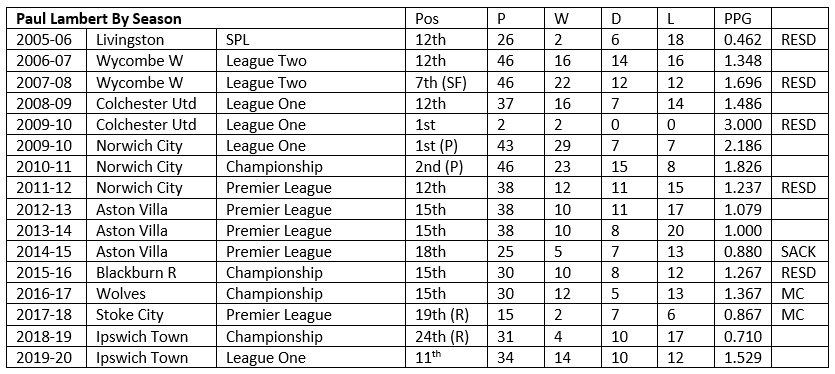
Key:
P = Promoted; R = Relegated; SF = Lost in play-off semi-final; F = Lost in play-off final; PO = Won play-off final; D = Demoted.
Figures are league games only; cup matches and play-offs are not included.
League position shown is either the position at the end of the season or the position at the time of departure.

Writer: Scotimp
If you haven’t already had a go at our quizzes, this is a great way to learn some random information about the Football Club, as well as helping us generate much-needed page views: Quiz No.1, Quiz No.2, Quiz No.3, Quiz No.4, Quiz No.5, Quiz No.6, Quiz No.7, Quiz No.8, Quiz No.9, Quiz No.10, Quiz No.11, Quiz No.12, Quiz No.13, Quiz No.14, Quiz No.15, Quiz No.16, Quiz No.17, Quiz No.18, Quiz No.19, Quiz No.20, Quiz No.21, Quiz No.22, Quiz No.23, Quiz No.24, Quiz No.25, Quiz No.26, Quiz No.27, Quiz No.28, Quiz No.29 and Quiz No.30.
Who Are The League One Managers?
No.12: Paul Lambert (@IpswichTown):https://t.co/BBgjNMCAHm#ITFC #Ipswich pic.twitter.com/ktRcCmWhHc
— Vital Lincoln City (@VitalLincoln) September 2, 2020
https://www.facebook.com/VitalLincolnCity/posts/3237029139666642
